Becoming Mothers
Posted on May 12, 2023
Beliefs, Child, disability, education, Health, International, marginalized, stigma, vulnerable
During my three days of labor, I often thought of Kenyan mothers and how much harder the birth experience is for so many of them.
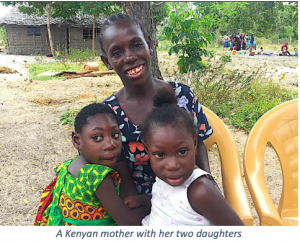 When it was over, I’d been attended to by two doctors, five midwives, and ten nurses. I’d received an epidural for the pain and Pitocin to strengthen my contractions. My daughter’s heartrate had been monitored constantly. I had played music and laughed with my husband during the Cesarean section.
When it was over, I’d been attended to by two doctors, five midwives, and ten nurses. I’d received an epidural for the pain and Pitocin to strengthen my contractions. My daughter’s heartrate had been monitored constantly. I had played music and laughed with my husband during the Cesarean section.
A day later my mother, cradling her newborn granddaughter, looked up at me with tears in her eyes and said, “Don’t you feel so strong now?”
“No.” I said. “I feel rich.”
Giving Birth in Kenya
Maternal mortality rates are 10 times higher in Kenya than in the U.S. This is largely due to a shortage of facilities, staff, equipment, and medicine. Only 16% of Kenya’s health facilities are able to provide emergency obstetric care, and each year, 75,000 women deliver without any type of skilled health-care coverage.
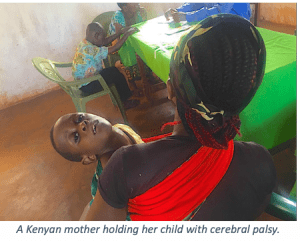 Transportation barriers also cause challenges. Only 7% of Kenyans own a car and public buses in rural communities are rare and often unreliable. In some rural Kenya communities, it can take a pregnant woman up to 20 hours to walk to the closest health-care facility. As a result, patients from remote areas are especially at risk for pregnancy-related complications.
Transportation barriers also cause challenges. Only 7% of Kenyans own a car and public buses in rural communities are rare and often unreliable. In some rural Kenya communities, it can take a pregnant woman up to 20 hours to walk to the closest health-care facility. As a result, patients from remote areas are especially at risk for pregnancy-related complications.
Disabilities Caused During Labor
At Kupenda, I see the impact of these challenges every day among the mothers and children we serve. Poor obstetric care often means mothers leave their deliveries with severe anemia, incontinence, damage to the reproductive organs or nervous system, chronic pain, and infertility. These problems are widespread both in and beyond Kenya; globally more than 15 million women develop these disabilities during childbirth every year.
Fetal distress is also common in Kenya. Without the equipment or skills for close fetal monitoring, thousands of Kenyan babies are born each year with cerebral palsy, brain injuries, vision loss, hearing loss, learning disabilities, and mental health disabilities.
What Would Have Happened?
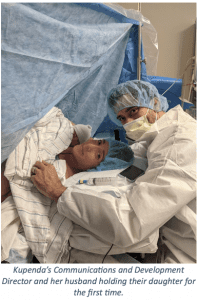
After three days of labor, my daughter still wouldn’t budge beyond nine centimeters of dilation. We later learned that she had wedged her arm beside her face and there she’d stayed for 72 hours, despite the maximum dose of Pitocin and my endless contractions, prayers, and position shifts.
Eventually I was told I needed a C-section. I was disappointed and afraid but given exquisite care throughout the procedure. After just an hour, I was holding my healthy baby girl.
“What would have happened?” I said afterwards, staring at her soft pink face. “What would have happened if she’d stayed stuck like that, and I had not had the option of a C-section?”
Again, I thought of those Kenyan mothers. Again, I felt rich.
It all seemed incredibly unfair.
Kupenda’s Preventative Care Activities
Childbirth is scary even for the wealthy. Babies’ hands get wedged in the wrong places. Labors go on for days. Things go wrong. Mistakes are made.
How much more so for women who deliver in under-resourced settings?
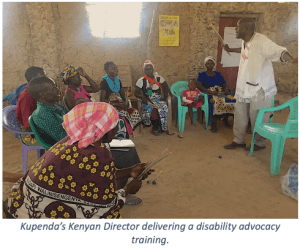 On Mother’s Day, I’m remembering the thousands of Kenyan women who have not had the option of professional care, pain medicine, or C-sections. I’m remembering the children with disabilities they’ve birthed–some of whom I’ve met during my field visits.
On Mother’s Day, I’m remembering the thousands of Kenyan women who have not had the option of professional care, pain medicine, or C-sections. I’m remembering the children with disabilities they’ve birthed–some of whom I’ve met during my field visits.
At Kupenda, we talk a lot about helping these families cope with their disabilities and access the care they need to thrive. But lately, we’ve also been talking more and more about how to prevent these disabilities in the first place by improving access to prenatal care. We are now doing that by training traditional healers, community health workers, and traditional birth attendants in Kenya. Our Kenyan field team is teaching these influential leaders about the causes of disability and how to help women access accurate information and quality care, before, during, and after they go into labor.
I’m proud to be part of an organization doing this work. It doesn’t make the situation for mothers in Kenya any more just, but it does reduce the risk of labor complications and improve their chances for a healthy life.
Happy Mother’s Day, from our Kupenda family to yours.
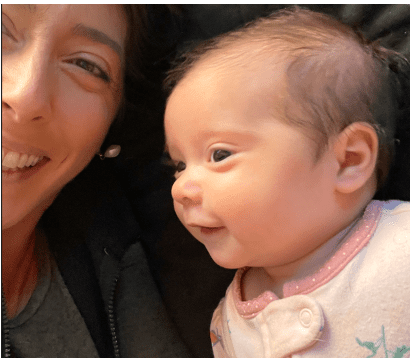



Leave a Reply